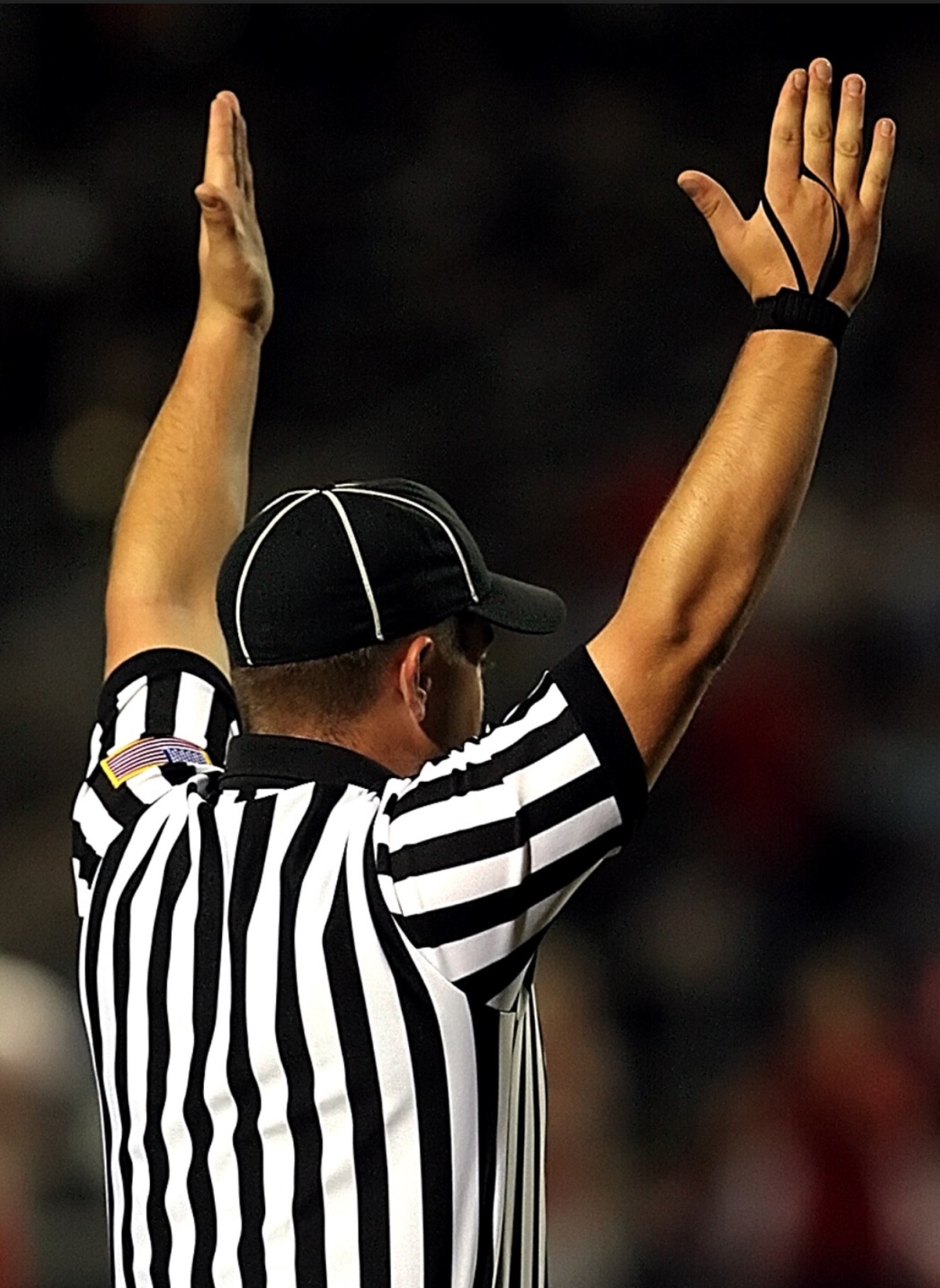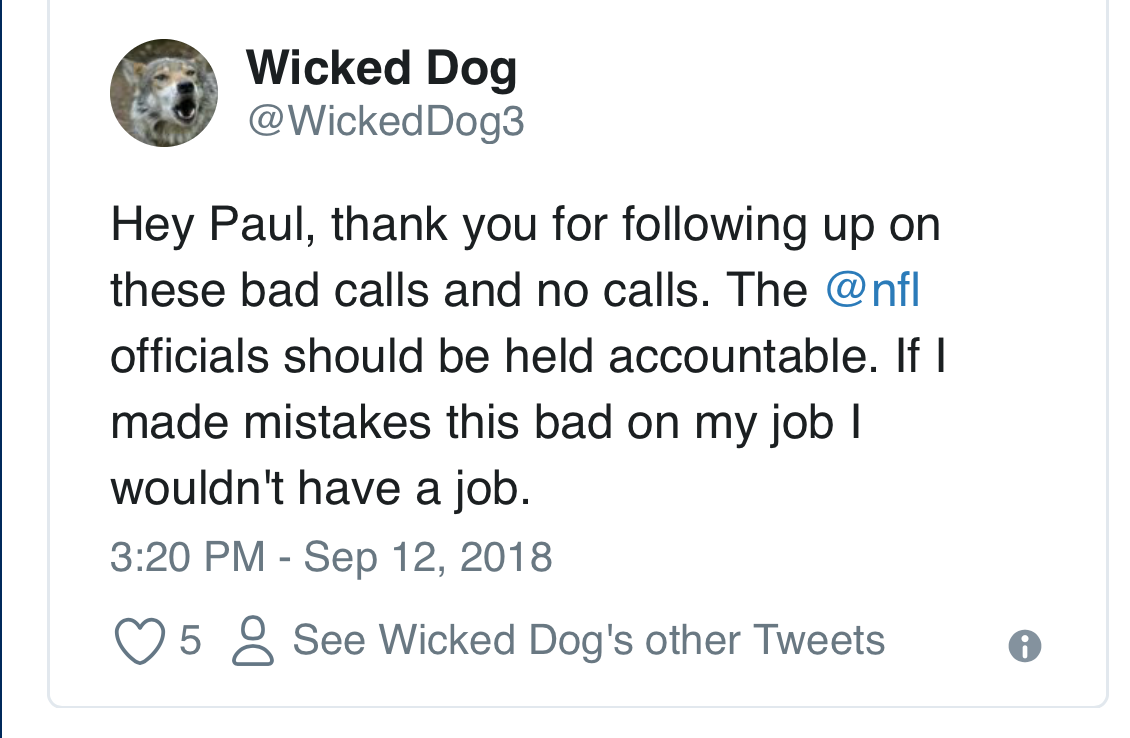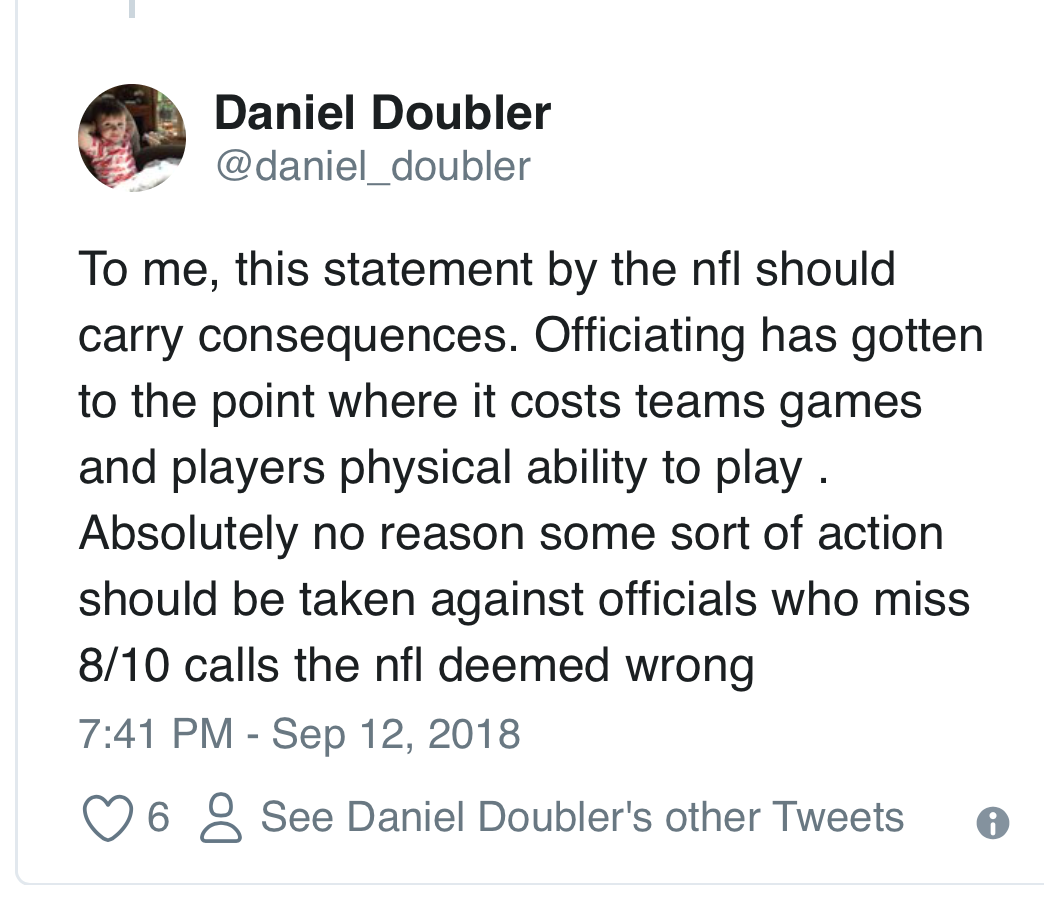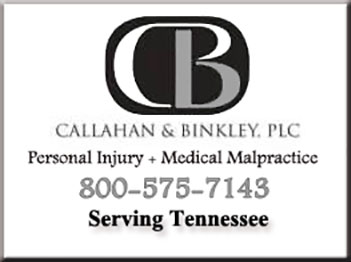
The cool-down period is over, the coaches have talked, the quarterbacks have spoken, players pulling on their ties and folding down their collars or sliding their feet into flip-flops have answered questions.
All of them are held to account.
Simultaneously, the officials clean themselves up and gather their things. But they leave the stadium in the shadows, answering for nothing.
The only way we hear from them is if a media member requests a pool report about something specific in the game.
And those are typically disasters, where tape recorders are stacked up and protocols are followed that all but ensure no meaningful answers. I resist asking for them, because a pool reporter has to waste his post-game in the name of nonsense.
We know the consequences of being poorly graded, in-house, are grades and rankings that can cost zebras playoff game assignments. But let’s say, hypothetically, officiating is poor league-wide. The best of the worst get the most important games and the worst of the worst have their season’s end early. There is pride involved there, and maybe money.
In 2015, I complained when a critical missed call in one game led to a demotion for official Greg Wilson, who was taken off a national game the next weekend and moved to, you guessed it, a Titans' game. To me, that treated different teams differently. It didn't punish Wilson. It punished the Titans and the Dolphins.
The league sees the playoff assignments as the weighty result for the work-product of officials.
Is that consequence anything like player fines and suspensions for extreme faux pas?
Is that consequence anything like standing in front of bright camera lights and answering for mistakes publicly?
Is that consequence anything like watching film broadcast on a wall in front of your teammates and critiqued by your coach?
Too god damn late now. I’m tired of this. Ridiculous. Fire their ass. When everyday people continually make mistakes we get fired. Same should be said for NFL Officials. Beyond over it. https://t.co/VQJSbyaTak
— Johnny Thomas (@_JohnnyThomas) September 12, 2018
Among the top clichés in football is "The eye in the sky doesn’t lie.” And the players who are under the watch of that eye, and the coaches who position them on the chess board, are under constant internal and external scrutiny.

I’m part of a profession that can pay some people pretty well to scrutinize. Players, coaches, and let's add executives here, have to be able to deal with professional scrutinizers.
Why, then, can Jerome Boger operate in secret before and after he’s on the field, doing horrible work?
To me, this statement by the nfl should carry consequences. Officiating has gotten to the point where it costs teams games and players physical ability to play . Absolutely no reason some sort of action should be taken against officials who miss 8/10 calls the nfl deemed wrong
— Daniel Doubler (@daniel_doubler) September 13, 2018
Why are NFL officials above holding a mandatory post-game press conference as part of their jobs?
The league seems to likes officials to be semi-anonymous, even though now-retired Ed Hochuli became famous for his muscled arms. It’s at least in part because they don’t want them to be easily approached by the sort of people who might try to tamper with a game. Such tamperers, however, can surely find whomever they like.
Another big reason for officials to only be held to in-house accountability is that the league wants to minimize officiating as a story.
How’s that working out?
It’s a constant story.
The league telling Mike Vrabel, 17 days after the game, that it was wrong on eight of 10 plays he questioned in the Titans’ third preseason game is a story.
Why does it take 3 weeks for an answer? That is as bad as the officiating. This league should have a large full time crew critiquing every call from every game in real time. This is the single biggest issue facing the league right now bar none and directly linked to ratings.
— Gary (@GaryThielman) September 12, 2018
The league telling Vrabel that William Hayes’ hit on Marcus Mariota on opening day in Miami should have been a penalty is a story.
Fans constantly tell me that it’s not the protests that are driving them away from the NFL, but that it’s the officiating.
I used to steer clear of these conversations as best I could. Fans have always bemoaned the officiating of their team. The ref or the umpire always has an agenda against their team.
Unacceptable. Officials should go unpaid for getting this many calls wrong. https://t.co/NaVFne8vht
— Justin Neal (@justin_neal) September 12, 2018
It’s typically been nonsense.
Even increasing bad calls generally even out. I still tend to believe that. But the two teams at Hard Rock Stadium were sort of even and the calls weren’t.
The Dolphins won Sunday so they didn’t have much to complain about. Still, how many calls did Adam Gase have to ask the league about compared to Vrabel’s list?
admitting they were wrong after the fact makes it worse.....hard to get every call right in the league but 80% should be unacceptable
— Dustin Thomas (@WeAllCantBeMe) September 12, 2018
My older thinking would be that some opponent will later be the victim of a super-bad officiating day and the Titans come will out in balance.
It’s not hard to believe it can happen. But no one should be put in position to root for or expect it, and another uneven day hardly solves the issue.
Don't put me with the crowd that thinks the Titans constantly get jobbed in a way others don't, however. Johnathan Cyprien didn't get penalized, ejected or fined for a hit that knocked Travis Kelce out of the playoff game in Kansas City last season. It set the Titans up for a big comeback and a win. And if it happened to Delanie Walker you would have gone berzerk. Just one example.

The game is fast and some calls are impossible to judge even when we watch close-up HD TV replays in slow motion.
Increasingly, the case against an upstairs official watching things and telling the ref that not only didn’t Delanie Walker commit a hold against the Dolphins on a 62-yard Derrick Henry touchdown run, but he was actually the victim of a facemask call.
The official threw the flag on that play was field judge Dale Shaw, who was roughly 22 yards away. He tossed it across his body and back toward the action while backing up and turning to run with Henry down the sideline.![]()
What did he see?
Don’t know. Can't ask. He saw holding, the NFL would tell us.
When Boger and members of his crew stood around three flags after a bit of a melee set off by a blindside block by Alan Branch on Taylor Lewan during an interception return, did they find clarity?
Nope. Boger announced three taunting penalties that conveniently offset and changed nothing. As a bonus, he did what he does best, misidentifying one of the players being penalized. Alas, someone realized the Titans didn’t have a No. 97 and he corrected himself.
Identifying players is officiating at its most basic.
How does the NFL regard Boger? Well, he has not been a playoff official in the last four seasons. But they didn’t let that stop them from hiring him as a full-time official. The league moved from 21 to 24 full-time officials this year, and he’s one of them. Maybe they are thinking, he needs the additional work. It can, however, also look like a reward.
Shouldn't a full-time job with the league come with prestige?
Having that person upstairs might help save a sport the public has decided is dying at some rate.
Even if it’s a slow death, why won’t the NFL be proactive on the major issues?
Officiating is a good place to start. Get it right. Just get the call right.
Transparency, not continued secrecy, is the solution.
Book a room for a post-game interview of Pete Morelli on Sunday around 4:00.
I’ll ask the first question.










You are not authorised to post comments.